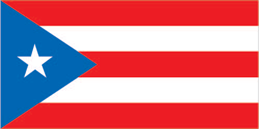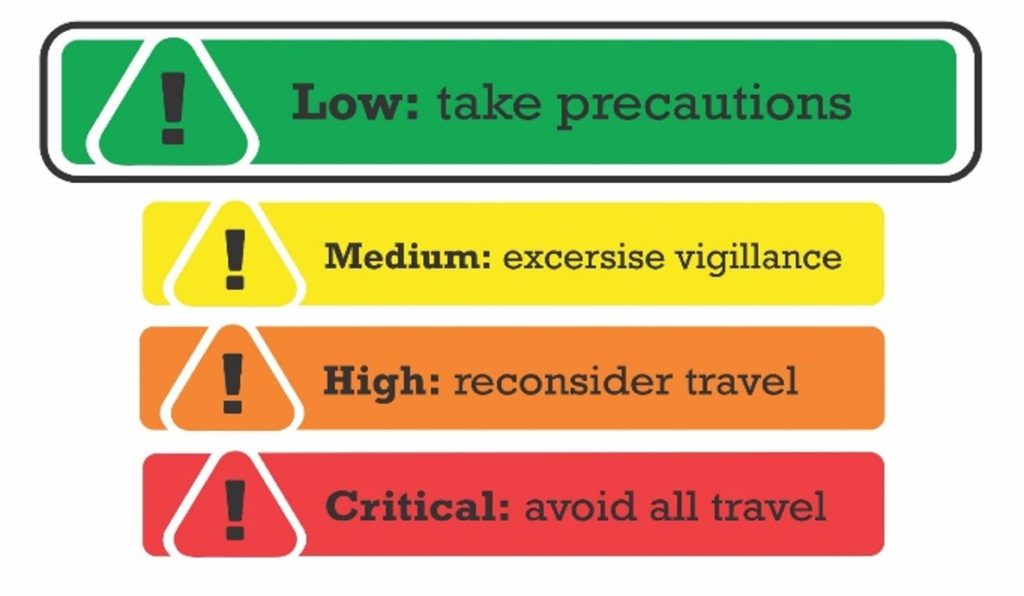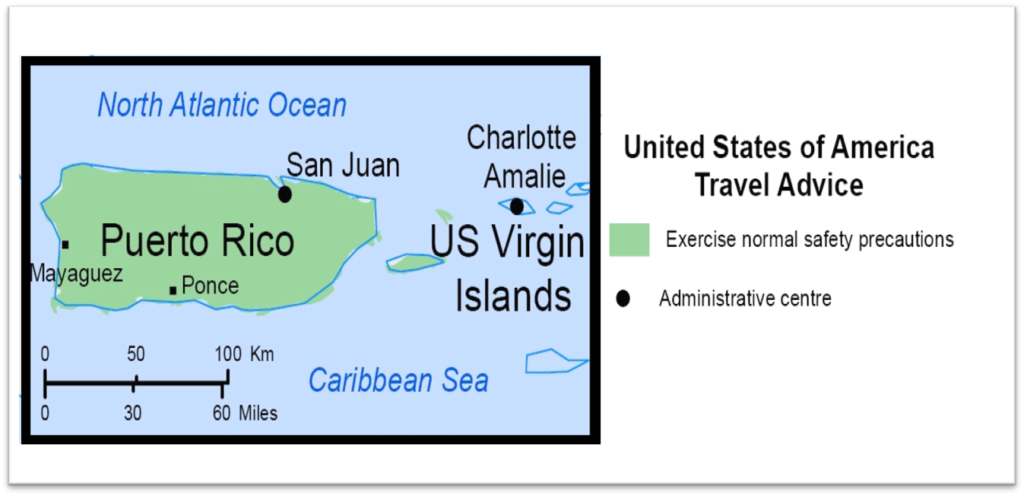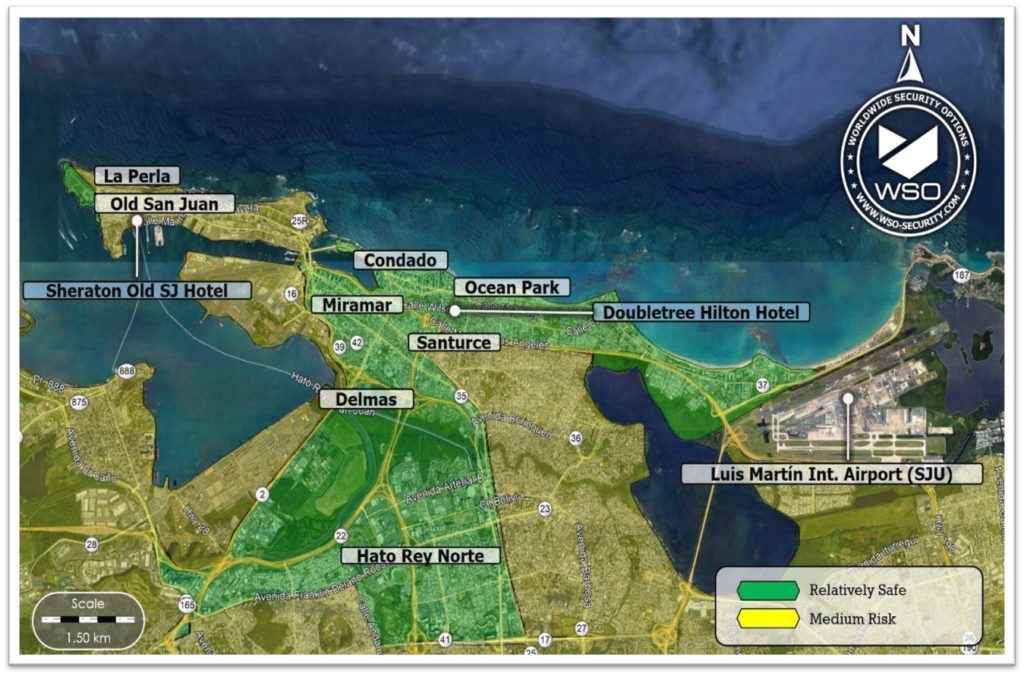| Official Name: | Commonwealth of Puerto Rico |
| Official Language: | Spanish & English |
| Area: | 9,104 km2 (3,515 sq mi) |
| Population: | 3,200,700 |
| Time Zone: | UTC−4 |
| Capital City: | San Juan |
| Elevation (San Juan): | 8 m (26 ft) |
| Currency: | USD |
| Main Cities: | San Juan, Bayamón, Ponce |
| Main Port: | Port of San Juan |
| Required visa for entry: | US visa, except passport holders of countries participating in the Visa Waiver Program (VWP). |
| Required vaccination for entry: | None |

Main Risks:
Theft, robbery, extortion, rape, fraud, vehicle assault.
Executive Summary
Puerto Rico features low risks chiefly associated with the possibility of suffering armed and unarmed robbery at the hands of common criminals. As a rule of thumb, if the itinerary involves high-profile visits, we recommend hiring secure transportation services, especially if travel through land routes is required.

General Risk Level: LOW.
The risk level remains steady throughout the island. That said, due to crime risks increase in low-income locales and neighborhoods. It is therefore important to remain cognizant of local circumstances before traveling to non-central areas.

Crime and Security
Low and medium-level crime represents the main threat to travelers visiting Puerto Rico. For this reason, travelers should exercise caution and take basic precautions to mitigate the risk posed by theft and armed robbery. Small-time drug trafficking and clashes between rival gangs are known to take place on the island. Violent incidents have increased in recent times due to the economic crisis and the relative lack of enough security agents. That said, visitors staying in central locations are not exposed to these trends.
Political rallies and events in Puerto Rico are usually peaceful. That said, as a rule of thumb, for security reasons, it is best to avoid the vicinity demonstrations.
Bear in mind that Puerto Rico has a storm and hurricane season between June and November. Adverse weather can lead to security risks, especially in seaside areas, and may lead to travel disruptions and deficiencies in basic services.
Security in San Juan
San Juan is considered a safe city. However, basic security precautions should be taken. Travelers should avoid non-essential travel to areas and neighborhoods removed from central areas that are more vulnerable to criminal activity, especially during the night hours. Risk sites are locally known as “caserios”. These are inhabited by low-income classes, especially on the outskirts of the city. Recommended districts for lodging, travel, and conducting business and transactions are Hato Rey Norte (Central Business District – CBD), Condado, Ocean Park, and Miramar in Santurce. While Old San Juan (old town) is deemed safe, it is important to stay alert due to the threat posed by opportunistic crime. Moreover, despite its popularity among tourists, it is not advised to enter La Perla.
The Luis Muñoz Martín International Airport (SJU) is located in the vicinity of the city. The trip between the airport and Hato Rey usually takes about 20 minutes depending on traffic.

Transportation
In Puerto Rico, while it is feasible to use public transportation to travel within central areas, travelers should exercise caution, especially if not familiarized with the transportation network. It is best to resort to taxis recommended by the main hotels or procure reputable transportation services. This last recommendation is especially relevant for business or high-profile trips.
Land routes are in overall good condition. However, we advise against traveling through sparsely populated areas during the dark hours or under conditions of poor visibility. If travel by land takes place, do not deviate from primary thoroughfares or highways. It is best to avoid secondary routes removed from central localities and which remain in poorer circumstances.
If travel through remote or sparsely populated areas is required, make sure to plan the route in advance under the supervision of local security professionals. Educated assessments should enable the security contractor to determine the safest route and avoid unilluminated or otherwise dangerous paths.
Health and Sanitary Conditions
It is recommended to have the following vaccines before traveling: yellow fever, tetanus, hepatitis A and B, and typhoid. It is also necessary to wear protection against bugs and avoid leaving body areas uncovered to mitigate the risk of suffering insect and mosquito-borne diseases such as Dengue, Chagas, and the Zika virus. These precautions must be followed while entering remote and jungle areas. The quality of tap water in Puerto Rico is relatively high. However, while staying in remote areas it is always best to resort to sealed bottled water.
It is not advised to travel without international health insurance covering hospitalization in Puerto Rico and the continent (US).
Take essential health precautions to mitigate the risk of contracting diseases or viruses. Carry masks in crowded places such as airports and maintain rules of social distance and avoid contact with surfaces of common use in public places. Always carry hand sanitizer.
Tactical Recommendations
Exercise vigilance and situational awareness throughout the trip to Puerto Rico, especially in urban areas vulnerable to low and medium-level criminal activity.
We recommend hiring private transportation services for business and high-profile trips.
Avoid carrying large sums of cash or valuables during the trip. We advise against wearing or carrying items in public that may give the impression of economic affluence and which could attract unwanted attention from criminals.
Do not resist armed robbery attempts. We recommend to always carry a few 20-USD bills for duress cases, specifically to appease criminals looking for easy money.
For security reasons avoid travel during night hours, especially outside centric areas.
We recommend lodging in reputable establishments and hotels with private security. In San Juan, it is best to stay in Hato Rey Norte, Conde, Ocean Park, and Miramar (Santurce).
If possible refrain from using public transportation. Resort to reputable radio taxi companies, provided they are recommended by the best hotels. Stay alert at all times while traveling by taxi to prevent the driver from taking unnecessary detours or from inflating the fare.
If travel by route through the countryside is required, avoid all detours, especially while traveling through sparsely populated rural or jungle zones. If possible, plan routes and stopovers ahead with the support of a local security contractor.
Avoid the vicinity of every kind of political demonstration or rally in urban areas. Peaceful demonstrations are liable to be infiltrated by violent elements.
Take all necessary precautions to mitigate the risk posed by insects and mosquito-borne diseases.
Emergency Contacts
Police: 911
Ambulance: 911
Fire: 911
WSO Global Command Center: +1 956 467 4858 / gcc@wso-security.com
Security advice and assistance over WhatsApp: +593 99 461 1128 / +521 81 1511 3166







